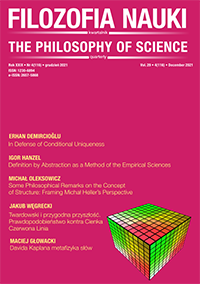Giuseppe Veronesego konstruktywizm arytmetyczny a poznawalność nieskończoności. Studium wybranych wątków filozofii matematyki we wprowadzeniu do Grundzüge der Geometrie von mehreren Dimensionen
Giuseppe Veronese’s Arithmetical Constructivism and the Cognizability of Infinity: a Study of Selected Aspects of the Philosophy of Mathematics in the Introduction to Grundzüge der Geometrie von mehreren Dimensionen
Author(s): Jerzy DadaczyńskiSubject(s): Philosophy, History of Philosophy, Philosophical Traditions
Published by: Uniwersytet Warszawski - Wydział Filozofii i Socjologii, Instytut Filozofii
Keywords: Giuseppe Veronese; constructivism; natural numbers; infinity; infinite sequences; cognizability
Summary/Abstract: In the first part of the article, Giuseppe Veronese’s concept of arithmetical constructivism is reconstructed from his dispersed remarks. It is pointed out that although for Veronese time is a necessary condition for the construction of natural numbers by an individual subject and the subject cognizes time in an a priori way, it is not a (proto-)intuition of the subject. This is a fundamental difference between the concept proposed by Veronese and the constructivism of Kant and Brouwer. Veronese’s justification of the subject’s ability to cognize infinity, represented in his text by infinite sequences, is analyzed in the second part of the paper. The only condition for the cognition of the infinite sequence is to have a rule according to which its successive terms “follow one another.” The price of the ability to cognize the infinitive “whole” (sequence) may be the uncognizability of certain “parts” (terms of sequence). Infinite sequences, cognizable according to Veronese, are allowed as objects of mathematical research, although they do not meet the condition of constructability.
Journal: Filozofia Nauki
- Issue Year: 30/2022
- Issue No: 3 (119)
- Page Range: 33-50
- Page Count: 18
- Language: Polish

